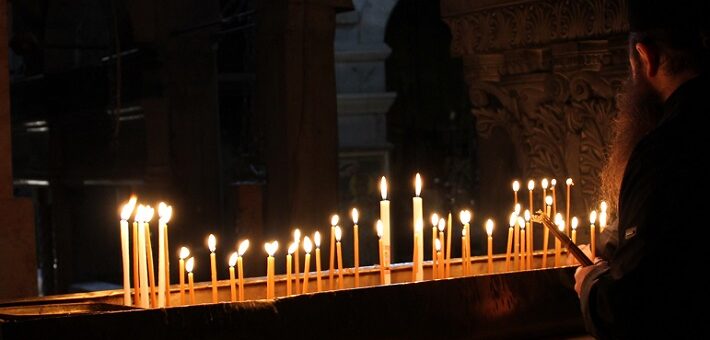Commentary on Daniel 7:1-3, 15-18
Daniel 7 is a watershed in the book that begins with six uplifting stories in the first six chapters. The last six present a series of fantastic dream and vision reports. The shift is dramatic not only in genre but also in perspective. For example, in the first half, when the faithful are saved from death, they cannot and will not take that for granted. In the second half, however, the faithful should consider death a definite possibility (see also 12:2-3).
Although around this pivotal chapter the story unfolds like the turning of day into night, the book cannot be neatly split into two parts based on genre. Curiously enough, Daniel 7 is part of the Aramaic portion of the book that starts in 2:4b and continues until 7:28. The book that starts in Hebrew transitions unobtrusively to Aramaic, a cognate Semitic language, in 2:4b, in which a Chaldean Aramaic speaker starts speaking. After his speech, however, Hebrew does not return, and the narrative continues in Aramaic. The Hebrew narration mysteriously returns in 8:1. Scholars have proposed various possibilities to explain this peculiar design of the book (such as partial translation of the Hebrew original to Aramaic or vice versa), but whatever may have caused the hybrid form, the present shape of the book effectively prevents chapters 1-6 and 7-12 from splitting the book into two parts. The book of Daniel remains as a well-integrated literary piece.
The hinge chapter of Daniel 7 contains a report of fantastic dreams and visions. In modern days dreams are unfathomably psychologized, but in antiquity the dream was a way to get in touch with the numinous world. In dreams, they considered that one often receives revelation and even prescriptions for difficult illnesses. The rich images of these dreams sponsor or require thoughtful interpretations. According to the Talmud, a dream that does not receive an interpretation is like a letter left unopened (Berachot 55a).
Daniel’s dream in this chapter takes place in the first year of a king’s reign. In the monarchic world, the first regnal year marks the beginning of a new era. It is time to imagine a better world to come, especially if the life under the previous king spelled misery for the people. With the change of administration, it is time to dwell on hope. Daniel records his dream, apparently realizing that it contains an important meaning for his time and the future.
Daniel’s dream has the backdrop of “the great sea” (7:2, 3). In the biblical world, the sea represents the world of chaos. Out of the troubled waters, four different beasts emerge—each with distinctive characteristics. Daniel, who is known for providing insight and confidence in the first half of the book, is terrified by the monstrous vision. However, Daniel does not wallow in fear. He does not remain in perplexity. He approaches one of the heavenly attendants to seek reliable understanding. In the first half of the book, kings and nobles turned to Daniel when they encountered incomprehensible dreams and questions. Now Daniel himself must turn to another being to understand what is going on.
Asking for the interpretation, Daniel seeks to know exactly what it means (Greek “precision,” verse 16). Hope cannot be constructed on fuzzy falsehood. The faithful, who fight against the false gods and oppression that threaten the life of the faithful, desire to be guided by the truthful understanding of what is being revealed in the dream and vision.
According to the interpreting angel, these beasts represent kings of the earth. In other words, this is a historical drama or a panorama of history. The interpretation lays bare the beastly nature of these kingdoms. Their behavior is marked by pride, greed, violence, and terror (see verses 4-8, left out of the lectionary selection). They rise one after another, suggesting that in spite of their brutality they will not hold their sway for long. The beasts, which signify empires, rise and fall.
In the end, “the holy ones of the Most High” reign (verse 18). The identity of the collective set apart by God is defined by whom they belong to—the Most High. This traditional name of God (see Genesis 14:17-20; Deuteronomy 26:19; Isaiah 14:13-14) calls attention to God’s sovereignty over the world as the highest authority. The loftiness is also a challenge to earthly powers that seek to prop up themselves in their endeavor of self-aggrandizement.
The process of owning the kingdom is depicted with the verb “receive” (Daniel 7:18). In other words, it is a gift from God. Regarding the coming kingdom of God, communicators often like to talk about building the kingdom of God. However, such a kingdom of God that humans build is foreign to the Bible in general and the book of Daniel in particular. In biblical tradition, humans do not build the kingdom of God. By contrast, God brings it, and the faithful welcome it.
The kingdom of God will be eternal. In history, mighty kingdoms came on the face of the map only to disappear forever. No nation is shielded from this fate, no matter how desperately it may pursue its own perpetuity. By contrast, the kingdom of the holy ones of the Most High will endure—not like the kingdoms of the earth represented by the beasts from the sea. In the triple emphatic declaration (“forever—forever and ever,” verse 18), repetition underscores the unbroken strain of praise along with the note of continuity of the kingdom of God.
The promise of the eternal kingdom of God is also a commentary on the temporary nature of the present tribulations of the faithful. The immediate prospect may be terrifying (see also verse 15). God’s triumph, however, will eventually come in accordance with God’s plan. For the time being, troubles may rage. There will be moments of despair for the faithful. In the end, however, they will emerge as “more than conquerors” (Romans 8:37), and the kingdom of God will be theirs for ever and ever.


November 6, 2022